Hey all! Thanks for the nice responses to yesterday’s recap, including the full bodied cheer for my nap! I’ve spent plenty of time this week fretting about the work I wasn’t doing, so the enthusiasm for sloth was welcome.
Yesterday’s events began bright and early, at 6 a.m., with some coffee. Complimentary coffee, courtesy of the Four Seasons Westlake Village, which had me swooning in my hotel room:
I managed to get a nice, hour-long workout in at the amazing gym. It’s rare that I can workout without the pressure of an imminent work day upon me, so it was awesome to just enjoy the sweat:
Next up was our breakfast presentation, led by Paulette Lambert, R.D. and C.D.E., who develops recipes for Dole and is director of nutrition for the California Health and Longevity Institute. This remarkable institute is a part of the Four Seasons Westlake, and I’ll have a lot more to say about it in my next post, when I recap our tour!
Ms. Lambert’s presentation was titled “Breakfast for Performance,” and it focused on healthy and wholesome eating strategies. Along the way, she gave us her opinions on various nutrition topics. Since I didn’t personally agree with everything in the presentation, I should disclaim now that, while Dole did cover the expenses of this trip, they also encouraged me to share my honest reactions to the summit with you on the blog. And of course, I would give you nothing less than honest reactions here at CR. Now that the summit has drawn to a close, I can say with assurance that my overall experience was resoundingly positive, and I feel so lucky to have been a part of this event. I didn’t, though, expect all of it to resonate with me, and this breakfast was probably what resonated the least. Some of this was due to my personal habits and politics as a vegan, and the rest was an objective resistance to what I thought were some very doctrinaire attitudes.
For all of the day’s emphasis on fresh fruits and vegetables, it seemed to me that Ms. Lambert preferenced processed low-fat foods over higher fat, whole foods – an attitude that’s not in keeping with my own thinking. This became clear when she used margarine rather than butter in all of the morning’s recipes (Smart Balance is her brand of choice). She also suggested egg beaters in place of egg whites, and “fat free half n’ half” (quotes denote the slightly oxymoronic title) in place of cream.
Let’s put aside for the moment the I personally find milk, eggs, and butter offensive. If you’re going to eat an omnivorous, all-encompassing diet, I believe that whole animal foods are better options than heavily processed, de-fatted margarines and faux-milks. Naturally, animal fats are bursting in saturated fat, which was Ms. Lambert’s reason for not advocating their use. I agree, but to that I’d simply say that anyone who wants to use these fats should use them moderately. A drizzle of cream or a little pat of butter seems to me at least marginally superior to foods that are both animal foods (like egg beaters), but also laden with coloring, soy fillers, and sodium.
What about Earth Balance, you ask? I’ve used it before, and I do buy it on occasion. But I prefer to use coconut butter when I need the sort of rich taste that butter (or imitation butter) gives. In fact, my use of coconut butter or oil is comparable to the way I’d suggest using regular butter: it’s a food that’s high in saturated fat, so I’d advocate using it sparingly (though it’s worth noting that there’s suggestive evidence that lauric acid doesn’t contribute to heart disease and inflammation the way saturated animal fats do). However, I still prefer it in very small amounts to Earth Balance, which is far more processed. I use Earth Balance when I really need a buttery flavor—in mashed potatoes, for instance, or in vegan baking—and coconut oil or butter in other dishes where a really rich fat is necessary. The rest of the time, I use more heart healthy, monounsaturated oils like olive and safflower. Analogously, I’d tell an omnivorous client to use butter and milk in very moderate amounts when the richness is necessary, just the way I use coconut oil and coconut butter, and to explore using unsaturated oils the rest of the time.
Ultimately, I believe that some amount of saturated fat has a healthy place in human diets (of course, I’d prefer that saturated fat to be found in coconuts rather than animal fats), and I don’t think that eschewing it wholesale is necessary—especially not when processed food is the alternative. Many women in the audience agreed with me on this point, and Anne also raised her hand to inquire about the margarine being used in breakfast. And what I found particularly irksome was that Ms. Lambert kept referring to Smart Balance as a plant-based margarine, and saying how superior it was to using animal fat: well, Smart Balance may not have saturated animal fats, but it is not an exclusively plant-based food! It contains whey, a milk derivative. If you’re going to try to support a plant-based brand with your dollar, why not simply buy Earth Balance? The extra gram of saturated fat in Earth Balance is hardly hazardous enough (especially since it’s all plant-derived) to outweigh the benefit of supporting a product that’s almost identical, but also 100% animal-cruelty free.
Ms. Lambert had a bunch of tasty recipes on the morning roster: stovetop oats, a smoothie, an almond butter and banana sandwich, and a parfait. She mentioned that she’s a great fan of using soymilk in oats, and in smoothies. It pleased me to hear that she’s supportive of a vegan dairy alternative, but when she immediately added that, in case we were wondering about whether or not soy is safe, we should put our minds to rest, I raised an eyebrow. I think you all have a sense of how I feel about soy: I think moderate amounts of relatively unprocessed, organic, non-GMO soy 2-3 times a week are a healthy part of a balanced vegan diet. But I believe we should eat soy in moderation, and avoid its more processed forms. Will I eat soymilk if it’s the only available alternative to regular milk? Of course! But I’d caution new vegans against eating it at breakfast, lunch, and dinner.
When Ms. Lambert said that the latest study soy and breast cancer risk shows conclusively that soy is actually breast cancer preventative, I was pretty shocked. If working in nutrition has taught me anything, it’s that the things we don’t understand far outweigh the things we do, and few things are ever conclusive. At the least, one study can’t outweigh decades of controversy, which is what surrounds the use of soy. There’s great evidence to show that phytoestrogens in soy can bind to estrogen receptors on cells, shutting out more powerful estrogens in the body and lowering breast cancer risk. Others suggest that phytoestrogens actually promote the growth of estrogen receptive cancer cells. There’s no definitive answer. I think that most of what we know suggests that unprocessed soy isoflavones are actually cancer preventative. But as the child of a breast cancer survivor, I prefer not to take any risks with excess. And for an R.D. to dismiss a question as complex as this one with one single wave of the hand was off-putting, at least to me.
Breakfast prep began in earnest now. Ms. Lambert was aided in the kitchen by Matt, her incredible sous-chef, who stuck around of the rest of the day’s festivities:
As she prepped a single serving of oats, Ms. Lambert finished them off in the microwave. Anne jumped in to ask, “isn’t it true that microwaving depletes more vitamins and minerals than other forms of cooking?” Ms. Lambert quickly said no, there’s no evidence to show that microwaves cause any less vitamin loss than other cooking methods (even gentle steaming). Again, I respectfully disagree. There is evidence on both sides of this debate: some to show that B-vitamins are destroyed more readily by microwaves than by other methods, and some to show that the shorter cooking time in microwaves is a boon to vitamin retention. We don’t know for a fact—or at the least, we don’t have a wealth of information that falls exclusively on one side of the debate or another. I’m not a microwave fan myself.
I flipped through my packet of materials, and read through the breakfast recipes. I was thrilled to see so many plant foods—fruit, almond butter, and whole grains—but also realized that nearly every recipe was about one ingredient away from being vegan. The almond butter and banana sandwich used honey, rather than agave, and ditto for the granola; the smoothie contained both soymilk AND yogurt. After hearing all about how terrific soymilk was, I couldn’t understand why we’d be instructed to add cow dairy to a soy-based smoothie (or, for that matter, why soymilk wasn’t an option with the morning coffee). It seemed as though we were being instructed to use soy in a supplementary way, but also encouraged to rely on cow’s dairy. It’s a pet peeve of mine when I see recipes that are almost vegan, but for the addition of a touch of yogurt or milk or butter—like the smoothie, or the roasted strawberries Ms. Lambert made with Smart Balance. I wish I could persuade people that any recipe that’s already close to vegan will be so easy to veganize, and that our small efforts to do so will give us the peace of mind that no animals were harmed for the food on our plate.
These, then, were my reactions. I loved that we were in a kitchen full of mostly vegan friendly foods, but I didn’t like the certainty with which Ms. Lambert did away with some really complex nutrition questions, and I really didn’t like that so many recipes that might have been veganized weren’t steered in that direction.
I also thought that Ms. Lambert’s attitude toward measuring and counting was a little doctrinaire: we were reminded that 1/4 cup is the correct serving size for granola, that women must eat no more than 10 grams of saturated fat daily, that there are four grams of sugar in one teaspoon, and—my favorite—we ought to be careful with brown rice, because there are 300 calories in a cup. With all due respect, this advice may be useful to people who are likely to eat a carton of granola, or 9 cups of brown rice, but a room full of health-savvy food writers is not an audience that’s at risk for such excess. Instead, the numbers talk came came across as a bit admonitory and joyless, and it seemed painfully in keeping with the stereotype of the finger-wagging American RD who is obsessed with calorie counting, food exchanges, and strictly monitored portion sizes. As an ED survivor, I find that kind of talk triggering, and as a nutritionist, I find it unnecessary: there are ways to encourage healthy eating that involve more relaxed forms of portion control and less stringent attention to numbers.
With all of that aside, I cannot deny that Ms. Lambert’s finished breakfast was an absolute joy to behold! Look at this spread! Fresh granola:
Almond butter and banana sandwiches:
…and there were also smoothies, scrambled eggs, a cottage cheese and granola parfait, and baked breakfast cake for the omnivores. I was so deeply grateful to Ms. Lambert and to Matt for accommodating me when I explained to them that I was a vegan. Matt instantly whipped up a honey-free almond butter and banana sandwich for me, while Ms. Lambert assured me that the oats were dairy free. The fruit salad being served was coated in a yogurt sauce (weird, I thought) but Matt rushed to make me a bowl of fresh, plump, and delicious Dole berries. So at the end of all this, I had a little vegan feast of my own, served outside on the sunny patio:
Almond butter and banana on whole wheat toast, fresh berries, oatmeal with vegan blueberry compote, and a splash of decaf. Perfect way to start the day, and to refuel after my time in the gym. The berries were so, so good:
And the oats were super creamy and not too sweet:
I’ll have to steal that compote idea!
So that you all could see the non-vegan offerings, I caught a photo of Anne’s plate. It was EPIC:
As a side note, Anne and I realized that no one understood why we kept saying “EPIC!” and “FAIL!” for these two days. Healthy Living Community, we missed you guys.
After this feast, there was a little time for frolicking in the sun. That’s me with Ms. Kathy:
Vegans unite!
And with my sunshine:
It actually occurred to me, as I was thinking about the presentation, that Anne and Kath and Elizabeth will be a new generation of RDs: a generation suited to the green foodie generation. Instead of numbers and measuring cups, they’ll emphasize sensible attitudes and intuition; instead of processed foods designed to mitigate the things we need less of (like saturated fat), they’ll advocate whole foods in moderation. Of course they all realize the importance of calorie counting and portion control for certain people in certain phases of weight loss, and so do I, but I believe their emphasis is destined to be on a back-to-nature approach. I’m proud of them already.
How do you feel about the numbers game? Supportive, skeptical? I think calorie monitoring is useful for people who are either over or underweight and struggling to reach healthy ranges, and I think it’s also useful for athletes who are in serious training. Certainly I think it can be eye-opening for people who are eating very poorly, and have no clue what’s in the foods they abuse. But for generally health-conscious people, I think that calorie counting and strict adherence to USDA values becomes a form of slavery, and actually emphasizes the wrong kinds of nutritional priorities.
With that, I thank you guys for letting me sound off about some of my reactions to the presentation. Of course, I admire the work of anyone who’s helping to spread fruit and veggie awareness, which is why I tip my hat to Ms. Lambert for everything she does. I also thank her for being patient with a feisty vegan blogger and her breakfast requests. I was lucky to hear her perspective.
I can’t wait to return with a recap of the Dole nutrition panel, our tour of the Dole factory and lunch at their cafeteria, and our faux Iron Chef challenge for dinner last night! But for that, friends, you’ll need to wait a few hours. Have a great Friday evening, and I’ll see you tomorrow.
xo
This post may contain affiliate links. If you use these links to buy something I may earn a commission. Visit my privacy policy to learn more.


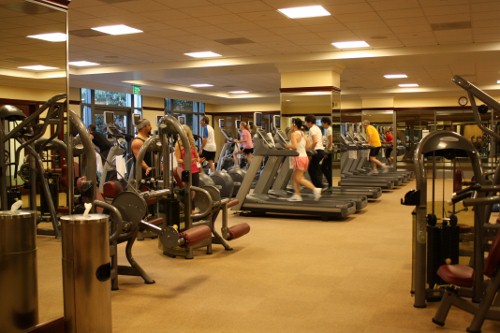
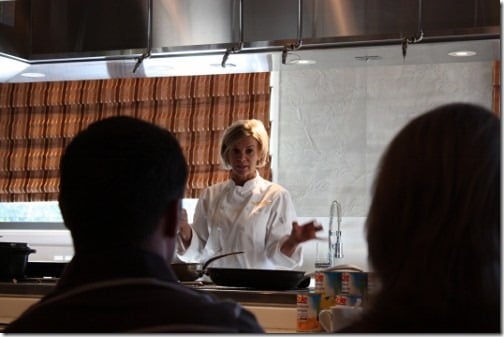
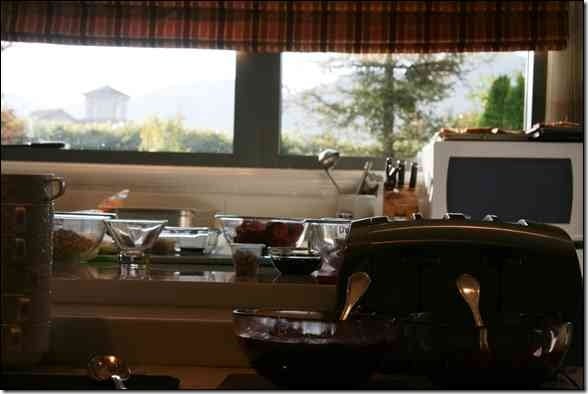
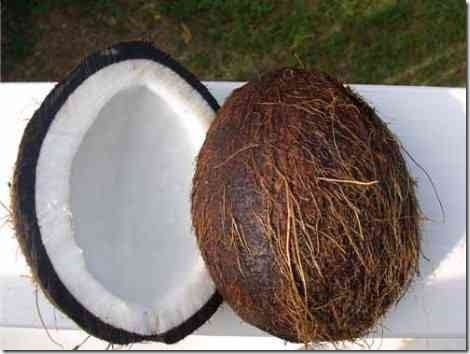
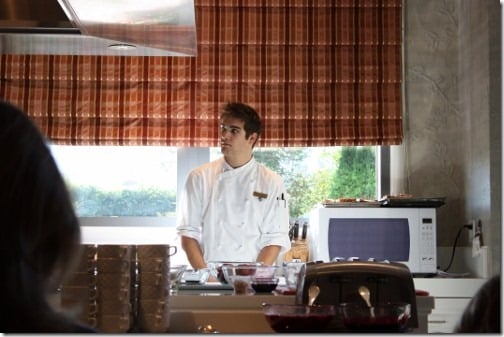
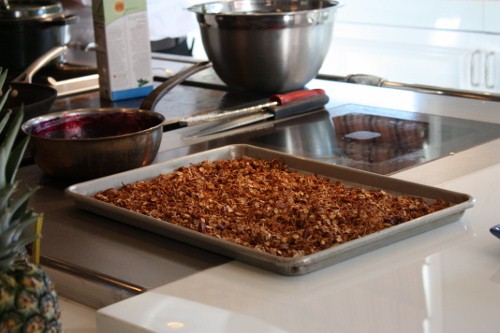
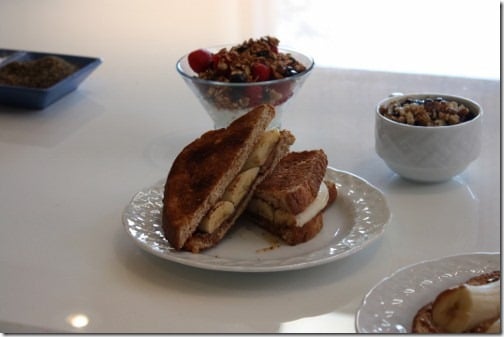
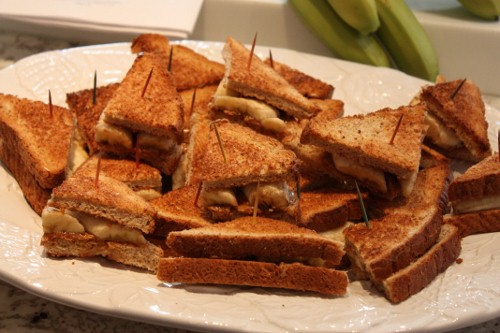

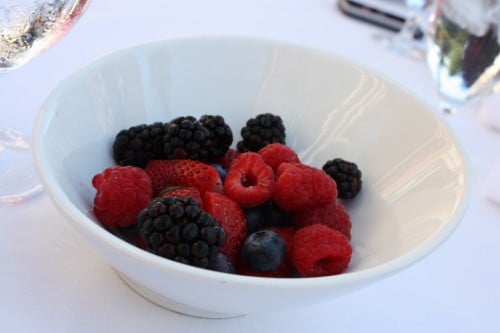

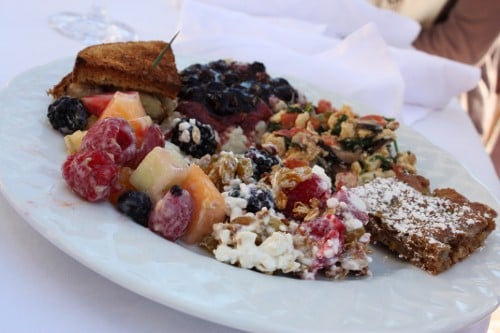
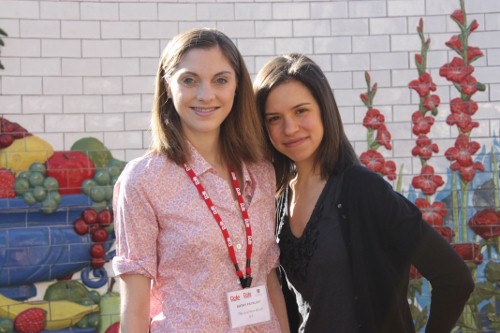

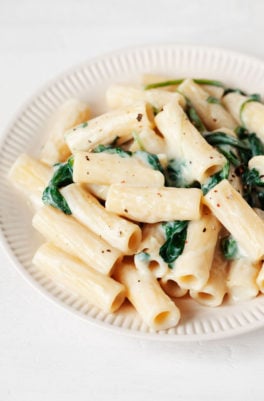
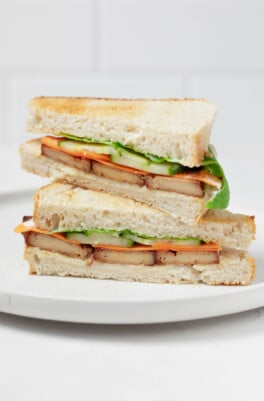
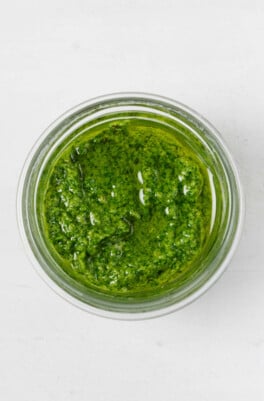
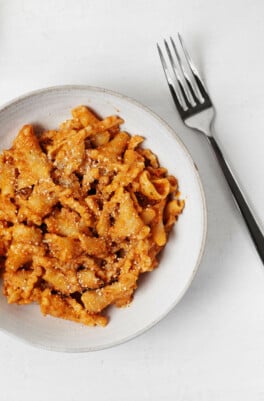
Leave a Comment
Yet another fantastic post. I am not vegan, so I am in the camp that would promote whole foods vs. processed alternatives. It is one of the things that actually holds me back from being 100% vegan – I just have a hard time with the concept of highly processed animal product alternatives like soy milk and fake cheese/butter. I may get to that point some day, but, for now, try to eat minimal amounts of butter/cheese, but, when I do, I eat the animal stuff.
I appreciate the time you take to show both sides and, even though you have made your decision, you let your readers make their own.
In short, you rock. 🙂
I love the honesty of this post!
Your breakfast, in the end, looks superb! Banana and almond butter were MADE for each other in my opinion.
I just discovered your awesome blog from the Cheeky Kitchen and am so excited to have read your post regarding this presentation. As I followed others participants Tweets, I cringed at the amount of folks who did pass along the margarine facts and calorie facts to thousands of Twitter followers. You are a breath of fresh air!
I do consume animal products but as a mom, I find it SO important to pass along ALL, HEALTHY options to my children! Can’t wait to come back for more of CR.
I was a religious calorie-counter for quite a few years, and I was never truly happy with my food or my body during that time.
I’ve since started to set myself free from counting and I’m much happier for it, although it is really hard to stop after you’ve been analyzing every bite you eat for so long! I do not consider myself to have ever had a true eating disorder, but I do find any talk of counting calories triggering and I really try to remove myself from any situation where it is being discussed because it would still be so easy to fall back into it.
I agree though that it can be a useful tool for some people, especially those who are trying to lose weight and have never given much thought to portion size before.
I really enjoyed your commentary! You present your views in a very thoughtful, logical way.
love it! I’m sooo not a fan of microwaving produce. Raw is best when you have fresh, local ingredients. I do agree frozen fruit can be great too.
And of course I totally agree on the “calorie counting” issue. Eat to feel GOOD about yourself and your body — not to feel bad about playing “the numbers game”
ps hope u got my emailed pics OK! You looked beautiful in all them!!
xoxo Kathy
Since I was not at the Dole Summit I always turn to you for honest recaps Gena! Well said. I am quite honored at the shout-out and agree with you on many points.
I definitely advocate a whole-foods approach, and while i am vegan, like you i agree that butter and dairy are probably much better for you than faux margarines and imitation products. There are several things I disagree with more old-school nutrition doctrine, but i know there are many bright young rising stars who are ready to shake things up! the low-fat, calorie counting regime has obviously not solved our country’s weight problem (with numbers rising it’s most likely just made it worse). i know from personal experience that calorie counting and measuring can easily lead to obsession and disordered eating patterns. As a soon-to-be-registered dietitian i hope to work with clients to honor their hunger, eat mindfully, whole, nutrient-dense foods, that are healthy for their mind, body and the environment, while fostering positive body image. Do we have a lot on our plates? yes. but i think it’s a worthy endeavor. keep up the great work!
Great recap, Gena! I hope that the folks at Dole learned a thing or two from all your questions and maybe that they understand the vegan point of view a bit better.
The numbers game used to make me a bit crazy. For a time in college, I ate those “Zone” protein bars morning, noon and night because I felt I had to rely on something processed just so I’d know the calorie count. I can’t even imagine doing that now. Do I know how many calories were in the steamed kabocha squash, kale chips and banana I’ve had for dinner tonight (so far)? No.
I’m super proud of the fact that that answer is finally “No.” Years ago, it would’ve nearly given me a heart attack not to know!
Thank you for this very interesting post. It sounds like you were very patient and yet politely persistent in a frustrating context.
I’m with you on the triggering nature of all that counting. I also think that the saturated fat recommendations are possibly out of date. Personal experience: I have had so many improvements in my health since I’ve been eating a lot of coconut oil (and I think you’re probably right too that plant-based sat fats are a different game than animal-based). And it’s well-known now that the sat-fat/heart disease connection was a misconnection based on the lumping together of trans fats and sat fats. It seems that there are more and more studies nowadays that show how important _some_ sat fat intake is (which you do also say). (Btw, that smart balance stuff: does it have trans fats in it?)
I love that they accommodated your needs food-wise. But I’m a little shocked by how basic-level and even preachy the talk sounded. You were a very highly educated bunch of folks she was speaking to…
looking forward to hearing the rest of it!
love
Ela
Wow thanks for this! As a vegan, I find that when I use whole fat foods (rather than processed reduced fat foods) I actually feel more full longer. Since the purpose of food is to satisfy and fuel (and to enjoy!), I tend to think I would rather use a little oil, or Earth Balance, or unprocessed nut butter, than some fake version that has fewer calories. Nutrition, as you rightfully point out, is not only about calories counts. You asked specifically about calorie counting. I have done it in the past to achieve weight loss goals and I’m right now very close to my goal weight. However, there is something inside me that is so resistant to doing it again. I find when I’m calorie counting, I eat processed foods more. Why? the nutrition label! The calorie count is right there on the package, so I eat packaged foods. Sure, I can look up the number of calories in a piece of fruit or vegetable or quinoa or…but it’s bothersome and interferes with my day too much. So it make it easier, I eat foods that come with nutrition labels. I’ve noticed since making a move towards more whole less processed foods, thanks to CR and other blogs, I feel better. However, I don’t calorie count and I’m above my goal weight. Which leads me to wonder – is this number the right number for me? And how does one figure that out?
Hmm. I found it interesting as well about the saturated fat ideal. I personally rather eat an whole egg verses egg beaters as well as real butter verses a fake spread. Its all about moderation with everything but coming from a highly restricted diet from my past ed I’ve found its better to have the real thing and get some nutritional benefit then something synethic. I really wish people understood the idea of whole foods – complete foods. Calories really are about quality over quanity. I always ask myself nutritionally how will this better my body?
I really agree though with coconut oil, olive oil ect. I think they are fantastic ways to get your fats in without ingesting animal fats.
Always enjoy your thoughts and experiences!!
Maggie
Mybreakfastblog.com
I appreciate your honest views about the presentation. As I am studying to be an R.D., I think it’s so very important to recognize that research is incredibly inconclusive on things like soy/agave nectar/etc. at this point in time, and to make that fact known to people who ask the question. I get incredibly frustrated with both R.D.’s and bloggers who claim controversial issues as fact/fiction, instead of presenting both sides and letting people choose for themselves (basing their practices on their views of animals or whatever the case may be). I hope to see an increase in the number of R.D.’s and bloggers who can cite both sides of the block and openly classify their practices as personal choices.
You just pointed out a good chunk of issues I had with traditional RDs. I used to be in an RD program at my undergrad, but I REALLY couldn’t take all the crap that was being taught. I was soo tired and frustrated with milk being praised as a wonderfood and especially the emphasis on #s (I can’t tell you how crappy learning the diabetic exchange system was!)
Loved the balancing honesty in your post!
Thank you so much for the well thought out post. Even though I still consume dairy in small amounts I couldn’t agree with you more on every point! I also totally love your honesty… esp. with Dole footing the bill. Much Aloha from Maui!
very interesting! i hope we’ll get back-to-nature soon enough too. it is up to all of us health bloggers to aim towards that direction!
I wonder if Ms. Lambert is going to read this? 😉
I think her main fault was in not backing up her claims more. It’s perfectly fine to have opinions and disagreeing opinions so long as you can justify your reasoning. But I don’t think that “that’s too much saturated fat” is reasoning that’s been explored enough. I know she would hate my diet. But I have to cringe at anything labeled “fat-free half & half”. That’s not even half & half anymore. That’s just half, and not the fun half. I can understand where she’s coming from in saying not too eat too much brown rice, but I think a more sensible way of saying it is “Eat food. Not too much. Mostly plants.” And I admittedly go through a box of earth balance a week, but that’s life as a novice baker. At least they’re not tubs of crisco.
“That’s just half, and not the fun half.” HAHAHA love it.
I think your take on this is refreshing and needed. I am thrilled that Dole is taking steps in the right direction and the future of nutrition is so inspiring! The almost vegan stuff and pushing of processed foods would have turned me off too.. but it sounds like they are at least somewhat open minded so that’s good. Maybe at the next conference they will have more than one Nutritionists’ perspective.
what a gift you have!!!! I have learned so much from you, thank you,
vicky
I am a regular reader, albeit one that doesn’t comment much. But I had to with this one because it was so wonderfully written and so absolutely aligned with my way of thinking. You are so gifted in your ability to get your point across in a factual, informative way.
As a former NPC Figure competitor, I spent a number of years having to log every calorie and ensure a certain ratio of macronutrients, and I can tell you that it can quickly send a normal eater across the line into obsessive tendencies. I’m so thankful to have found my way out of it! I feel calorie counting and number crunching can have its place when one is just starting to find their way into healthier eating, but really only in order to get a sense of whether they are overdoing it in terms of regular intake. But use it as that – a learning tool – and then move on from it toward focusing on what a food can do for you healthwise rather than how many grams of carbs, fat or protein it has.
Thank you for another wonderful and thoughtful post, Gena!
I guess I see your point about the fakes being not as good as a whole food in general although I could never advocate the use of a “real” cream versus half and half. To me neither them is really food and I can never put my ethics aside. I guess I’d make a crumby nutritionist for a non-vegan person. But it does seem kind of old-school to do that.
I haven’t done enough research on the soy debate to really know where I stand. I avoid it for completely different reasons that estrogen, although I did notice my menses are a lot less crampy not eating it. Although if I adopted a baby and had to feed him or her formula, I’d feed soy over dairy for sure if those were the 2 options.
I’ve only counted calories a few times when I first started eating raw just to get a gauge of if I was eating ENOUGH. It was helpful as a check-in measure, but not as a way to rule ones life. I am assuming maybe this dietitian was telling you this because some nutritionists are required to make meal plans with calorie counts.
good for you for advocating and saying your honest opinions!
Hi beauty:
Yeah, that’s a really good point — it’s hard for me to talk about either butter or margarine with animal milk in it as a “wholesome food.” But if both regular half & half and no-fat, highly processed half & half that’s full of chemicals are on a shelf, I feel compelled to tell an omnivore reader to get the regular stuff. Neither is vegan, and both signify cruelty to me, but one is cruelty+chemicals and processing. That’s two things that offend my belief systems when it comes to food and nutrition, rather than one — though obviously it’s the fact that neither are vegan that I find most outrageous (hence my true upset at the suggestion that Smart Balance is somehow ethical and plant based).
Counting calories is smart for new rawbies. But of course, counting calories can quickly turn into a scary game of limiting calories, so it’s a slippery slope.
And thanks! You’d have been proud — I was an outspoken lady all wk.
xoxo
lovely and well-worded recap.
way to represent us vegans and whole plant-based food!
❤
Well said, once again, Gena!! This was such a well- thought out, genuine post. Love your honesty and reactions. I’m SO in agreement with much that you said. I much more prefer high- fat, unprocessed and whole foods to low- fat, highly processed foods. Thanks for the input and honesty!
Gena,
I agree with you on the numbers game, especially with your comments to Izzy. For myself, I think calorie counting can be useful, as it is helping me to recover from my ED, though I look forward to the day I can put it on the shelf. I think it is useful for others, also, in giving them an accurate picture of what they are currently consuming versus what they should be consuming. It also helped me learn a lot about volumetrics.
Regarding the nearly-vegan food choices, I think it often has to do with the American Quest for Protein. That yogurt that just had to be in the recipe? Protein. Cow’s milk dairy? Protein. Americans are obsessed with it, and mistakenly think that they must add animal foods to any recipe in order to achieve some magical amount of protein. (“You’re a vegan? Where d’ya get yer protein?”)
As a scientist, I completely agree about the fact that the soy debate is not as cut and dry as she made it sound. In fact, nothing ever is….for the most part, you can find a study to de-bunk almost any common nutritional “myth’ if you look hard enough.
I’m not vegan, but I have a lot of friends who are, so I always try to have vegan options (and gluten/dairy free, since I am both of those), While I understand why you would be upset at the lack of vegan options, I don’t think that a recipe that is one step from being vegan is a purposeful omission. Likely it wasn’t even a thought in that person’s mind. If they aren’t vegan, and don’t personally know a vegan, you would not expect them to accommodate someone’s eating styles that they aren’t familiar with, right? Although, in your situation, when cooking for many people you would expect at least one option.
But, hey, cute Matt was helpful!
Hehe.
I love getting comments from you, Miss, bc you offer such a smart and scientific view.
so much to comment on. i agree with you wholeheartedly regarding the frustration when a dish is ALMOST vegan except for some tiny thing that couldve easily been omitted.
as for the soy thing. how annoying that someone educated (in theory) about the pros and cons of each side couldnt have gone into more detail or at least acknowledged the opposing side before simply waving her hand and dismissing it altogether. the balance of omega 3 and omega 6 in our diets is the balance that most people dont understand.
soy and corn are in EVERY freakin’ thing americans eat, and since she seems to favor more processed things, she is more than likely getting an extreme amount of omega 3 without the addition of more soy in her diet. that said, tempeh has the fermented kind of soy that is the kind you mentioned – proven to block the estrogen receptor sites. plus they dont have the inflammatory effects of non-fermented soy (ie soymilk, tofu, etc.). what it comes down to is we still dont know whats causing what, and its best to be cautious and practice moderation. to imply that you know something to be true with 100% certainty and then pass that info on to others as such is kinda dangerous and makes me really infuriated.
I could go on and on about this and the ridiculous use of fat free half and half (seriously? shes an RD using that crap? ugh), but instead ill back away from that impending rant.
and the number counting and portion lecture. geez. know your audience. unnecessary. i do know for a fact that there are BRILLIANT RDs out there, and as much as i hate to say it, ms. lambert seems to be completely bought by corporate america. after all, they dont pay her to say their products are going against what health and nutrition research has proven, they are paying her to sell their products.
oh and microwaving when you have an oven and live kitchen demo in front of you? pathetic.
Yeah, good point. I mean let’s put aside whether or not microwaves are bad for us. They’re gross! Real chefs don’t use ’em. Harumph.
As a registered dietitian, I’m part of that new generation of free-thinking RDs! 🙂 I have long had disagreements with mainstream nutrition principles and always advocate a whole food diet vs a processed food diet. I don’t advocate calorie counting and focus more on food quality. I think people find it refreshing and confusing at the same time because I’m not a typical dietitian.
Since the conference you attended was sponsored by industry, the views of the RD were likely representative of those generally held by the food industry (most “renegade” RDs would NEVER work for any food company like Dole). It is unfortunate that she drew such concrete conclusions on issues that are definitely not cemented in the minds of nutritionists or nutrition scientists.
Looking forward to reading more of your thoughts! 🙂
Em,
Of course you are among the next generation! Thanks for chiming in and offering your wise perspective.
G
What a wonderful recap! I can’t wait to read the rest of your conference posts. I think that everyone should hear the “food pyramid portion sizes” talk at least once, just to have a reference point, but I totally share your hope for the new generation to be more practical and intuition-based.
I’m a vegan junior in high school and have actually just recently decided to go to school to become an RD (though I plan to use it in business probably). I am very pleased with the shift towards more whole foods advocacy and agree with you that some of the things Ms. Lambert said were a bit too oversimplified. I like when someone of knowledge is able to show me a few sides of the story, providing me with the information necessary to make my own decisions when there is not conclusive evidence. For what it’s worth, my PhD chemistry teacher told me that as far as he’s studied, microwaves have no effect. However, my biology teacher told me the exact opposite. I guess this and the soy-debate should just continue to be treated how we treat most things: enjoy in moderation. On that note, I would really love it if you could share more about coconut. I used to not eat much of it because of its debated nutrition (plus I thought I was allergic, but I now know otherwise), but have now come to love it. I’ve heard that the medium chain saturated fatty acids in coconuts are actually treated well by the body because they are not stored as fat, being instead used for instant energy. What is your take on it? Also, you’ve said in other posts that you coconut oil is your oil of choice, but here you say that you only use it like you would butter. What do you recommend? Anyway, I really enjoyed reading your recap and thought you made very good points. I look forward to the new generation of RDs, too!
Have a lovely day!
xox
Wow girl, you are an excellent writer & you took the words right out of my mouth on this one. I agree with many of your thoughts regarding that presentation. In this case I must take what I like & leave the rest. I just feel sorry for those poor souls who don’t know any better 🙁
Great meeting you & I hope our paths cross again really soon. Love your energy 🙂
Counting calories never worked for me.
And as a forever recovering bulimic, who actually can eat a carton of granola or 5 bowls of oatmeal in one sitting, I still think they are useless. A binge is not going to be warded off by realizing that you are about to consume however many thousands of calories. I know. I just don’t care – I need the somewhat numbing comfort of it.
I suspect that simply eating a balanced utterly delicious meal, with no consideration whatsoever for the impact it has on your weight – but slowly and savouring every bite – is likely the best thing to prevent a binge. But I haven’t tried it in practice yet.
Great, thorough recap Gena. Thanks so much for including me in the next generation 🙂 I definitely feel a step to the left of many of my colleagues at times.
Wonderful post! The breakfast recommendations do seem a little off, but targeted to those hung up on more processed and/or “traditional” foods. For the most part, I am not a fan of processed foods and agree whole foods are better even if more caloric.
As for the numbers game … I hate it! I used to be big into calorie counting when eating more processed foods and it was a time consuming hassle. It’s a little hard now sine most whole foods lack in nutrition facts, but I don’t worry about it.
Almond butter and banana sandwiches have become such a comfort food for me!
Thanks for the honest review. too many food bloggers praise everything they are given but I appreciate that you still gave a thoughtful response, even when Dole was footing the bill.
So interesting to hear about ! Sounds like you and Anne could have run that conference 🙂
I love that you are so completely honest in all of your posts. So many bloggers are an inch away from getting tattooed when they get free stuff that it is refreshing to hear an honest opinion. For a food blogger sponsored event, I have to admit the breakfast seemed kind of boring. I guess I read a variety of blogs and see what a bunch of people (omni and veg) eat in a day and get a ton of ideas so I’d expect more for a sponsored event. Maybe Dole just needs to do more blog reading for inspiration 😉
I replied on Twitter, but 140 characters doesn’t cut it.
As a future RD, I am bound to the science for evidence based medicine, but there are many controversial issues. I think the best way to approach is to present both sides.
But the real challenge in my mind is to help a person apply that science to their everyday diet. There are many phases between the SAD (Standard American Diet) and a clean whole foods diet. So along the way, certain products like Smart Balance, or fat free half and half might be useful and be a reasonable compromise, even if they are not in the ideal end state.
Wow. I could go on and on but this was the first thing i highlighted that you wrote
“A drizzle of cream or a little pat of butter seems to me at least marginally superior to foods that are both animal foods (like egg beaters), but also laden with coloring, soy fillers, and sodium. “–
–I agree!
The whole food pyramid, RDA nutrition model, that whole “scene” if you will, is just not how I or you eat..and so to hear someone praise soy, instruct not eat more than 1/2 c of rice or 10g’s of sat. fat per day…I would have had to do a major eye-roll check-in on myself and hopefully bit my tongue.
Sorry to hear that you just had to sit back and listen to it all..not that it sounds all bad, but in those environments one is kind of a “captive audience” and along for the ride. Especially on a free trip 🙂 Hey at least the beds rock and the room is stellar 🙂
Seriously though, there is good info everywhere. There is bad info everywhere. It’s our job to weed thru it and pick and choose what works for us.
I dont count, tally, monitor numbers and stats. That’s just not my deal. Nor I know is it yours. There are times and individuals for whom it is useful but for me and my life, I really haven’t found a good reason to tally and count…so I dont 🙂
Well said. A lot to take in here!
I really loved reading this post. As a long time reader of yours, I appreciate your honesty in situations like these. So many other bloggers (not all – some) completely sell out their beliefs and convictions, and agree with everything presented at functions that are sponsored for them. Not everything the presenter at this seminar said was accurate, according to you (many things I do agree with you on), and you spoke honestly about them.
As someone recovering from an ED, I find the numbers game frustrating – I need to it get to my healthy weight, but the longer I stay with it, the longer I feel I’m stuck with my ED. I don’t think it’s necessary for everyone and I think if more people stuck with eating sensibly and intuitively, we wouldn’t have as many dangerously over AND under-weight people.
izzyy
xo
Hey Izzy!
Huge congrats on your ED recovery. I’m personally proud of you and cheering you on.
Counting was useful in helping me hit a good BMI, and it’s historically been helpful when I happen to be going through a dark moment where I’m tempted to restrict. It helps me feel nourished, and accountable. But on the flip side, I absolutely find it triggering to monitor the portions and macros and calories in what I eat, nor do I believe I need to. Learning intuition was a huge accomplishment for me, and took a long time. I hope you manage to hit a good weight and retain a knowledge of calorie ranges as a tool for difficult moments, but also move past it. Good luck to you 🙂
xo
Love the recap. I think the numbers game can be useful. When I started losing weight I had no idea how many calories were in the food I was eating. I counted fairly religiously for the first 20 lbs. As I continued to lose weight I started to just know how much of something I was eating. Today i keep a rough calorie count, but i have learned that 90% of the time I know when to stop without having to keep count.
wow…it sounds largely like a breakfast #FAIL to me. i don’t eat grains or dairy and you can most certainly bet i would never ingest egg beaters. my breakfasts are far too fatty for her liking. i eat things like: 1/2 avocado + 2 hard boiled eggs or a breakfast salad (massaged kale, with leftover roasted veggies and some raw nuts) or a nice chia pudding or hemp powder smoothie with almond milk. it offends me to think that she is clearly rejecting the science of soy in relation to women’s long term health. i felt like the literature is pretty clear with phytoestrogens and as a scientist i let the data speak for itself!